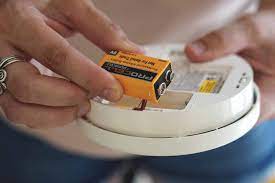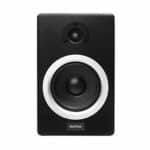Smoke detector batteries can be replaced with 9-volt disposable batteries that are widely available online and at local retailers. These batteries are specifically designed for smoke detectors and provide a reliable power source for the alarm to function properly.
Importance Of Smoke Detector Batteries
Why are smoke detector batteries important?
Smoke detectors are essential safety devices that can save lives in the event of a fire. However, a smoke detector is only as effective as its battery. Smoke detector batteries play a crucial role in ensuring that the alarm functions properly and can alert you in case of a fire emergency. Without a working battery, even the most advanced smoke detector is rendered useless.
There are several reasons why smoke detector batteries are important:
- Continuous power supply: Smoke detector batteries provide the necessary power to keep the alarm system running continuously. In the event of a power outage or electrical failure, the battery ensures that the smoke detector remains functional and can detect any signs of smoke or fire.
- Early detection: Working smoke detector batteries enable the detectors to function at their optimal level, allowing them to detect smoke and fire at an early stage. This early detection gives you more time to evacuate the premises, increasing your chances of survival.
- Reliable alerts: A smoke detector with a fresh battery provides reliable alerts in the event of a fire. It emits a loud, piercing sound that can wake you up from sleep or alert you to danger if you are in another part of the house.
- Peace of mind: Knowing that your smoke detector battery is in good condition provides peace of mind and reassurance. It ensures that your home and loved ones are protected from the dangers of fire.
Regularly checking and replacing your smoke detector batteries is crucial to ensure their effectiveness. It is recommended to replace batteries at least once a year or as per the manufacturer’s instructions. Additionally, testing the smoke detector on a monthly basis can help ensure that both the alarm and battery are in working order.

Types Of Smoke Detector Batteries
When it comes to keeping your home safe from the danger of smoke and fire, having a working smoke detector is essential. However, ensuring that your smoke detector is powered by the right type of battery is equally important. In this article, we will explore the different types of smoke detector batteries available in the market, their pros and cons, and how to choose the right one for your smoke detector.
Overview of different types of smoke detector batteries
There are several types of batteries that are commonly used in smoke detectors. Each type has its own advantages and limitations. Let’s take a closer look at some of these types:
| Type of Battery | Description |
|---|---|
| 9-volt disposable battery | One of the most commonly used batteries, the 9-volt disposable battery is affordable and widely available. It is easy to install and offers a decent lifespan, typically lasting for about a year before needing replacement. |
| Lithium battery | Lithium batteries are known for their long-lasting power. They have a significantly longer lifespan compared to disposable batteries, with some models lasting up to 10 years. However, they are more expensive than disposable batteries. |
| AA or AAA batteries | Some smoke detectors are designed to use AA or AAA batteries. These types of batteries are commonly used in other household devices as well, making them easily accessible. However, they may not provide as much power as 9-volt or lithium batteries. |
| Rechargeable batteries | Rechargeable batteries can be a cost-effective option in the long run. They can be recharged multiple times before needing to be replaced, reducing waste. However, they may have a shorter lifespan compared to disposable batteries. |
Pros and cons of each type
Each type of smoke detector battery has its own set of advantages and disadvantages. Let’s take a closer look:
- 9-volt disposable battery:
- Pros: Affordable, widely available, easy to install.
- Cons: May need frequent replacements, shorter lifespan compared to other types.
- Lithium battery:
- Pros: Long-lasting power, lifespan of up to 10 years.
- Cons: More expensive than disposable batteries.
- AA or AAA batteries:
- Pros: Easily accessible, commonly used in other devices.
- Cons: May not provide as much power as other types.
- Rechargeable batteries:
- Pros: Cost-effective, reduces waste.
- Cons: Shorter lifespan compared to disposable batteries.
Choosing the right type of battery for your smoke detector
Now that you are aware of the different types of smoke detector batteries and their pros and cons, it’s important to choose the right type for your specific needs. Here are a few factors to consider:
- Consider the lifespan of the battery: If you prefer a low-maintenance option, a lithium battery that lasts for several years may be the best choice.
- Take into account your budget: Disposable batteries are generally more affordable, while rechargeable batteries may have higher upfront costs but can save you money in the long run.
- Check the manufacturer’s recommendations: Some smoke detectors may require a specific type of battery for optimal performance. Make sure to follow the manufacturer’s guidelines.
- Consider accessibility: If you have multiple devices using the same type of battery, opting for AA or AAA batteries may be more convenient.
By considering these factors, you can choose the right type of battery for your smoke detector, ensuring that it remains powered and functional to keep you and your loved ones safe from smoke and fire hazards.
When To Replace Smoke Detector Batteries
Ensuring that your smoke detector is equipped with a functional battery is crucial for the safety of your home and loved ones. But how do you know when it’s time to replace the batteries? In this section, we will explore the signs that indicate it’s time for a battery replacement, the frequency at which you should replace smoke detector batteries, and the importance of regular battery maintenance.
Signs that indicate it’s time to replace the smoke detector batteries
When it comes to smoke detector batteries, it’s crucial to be aware of certain signs that indicate a replacement is in order. Here are a few indicators that should prompt you to swap out the old batteries for fresh ones:
- If you hear a chirping or beeping sound at regular intervals, it’s likely a sign that the battery is low and needs to be replaced.
- When you press the test button on the smoke detector, and it doesn’t emit a loud, piercing sound, it’s an indication that the battery is no longer providing sufficient power.
- Sometimes, smoke detectors have a blinking or flashing light that indicates when the battery is low. If you notice this flashing light, it’s time to replace the batteries.
Frequency of battery replacement
It’s essential to replace smoke detector batteries at regular intervals to ensure optimal performance. Most experts recommend replacing the batteries every six months. However, certain factors might require more frequent battery replacements, such as:
- If you have a smoke detector that uses a lithium battery, it may last up to 10 years before needing a replacement.
- In households with high humidity levels, batteries tend to deplete faster. Therefore, it’s recommended to replace them more frequently, such as every three to four months.
- If your smoke detector frequently goes off due to cooking smoke or minor accidents, the batteries may wear out faster. In these cases, it’s wise to replace them more frequently, around every three to six months.
Importance of regular battery maintenance
Maintaining your smoke detector batteries is crucial to ensure they are always in good working condition. By following these simple measures, you can prevent false alarms and ensure optimal safety:
- Regularly test your smoke detector by pressing the test button. If it doesn’t emit a loud alarm sound, it’s time to replace the batteries.
- Keep a record of when you last replaced the batteries and set reminders for future replacements.
- Regularly clean your smoke detector to remove any dust or debris that may affect its performance.
- Ensure that the batteries are inserted correctly and securely into the smoke detector.
- Consider using long-lasting lithium batteries for extended usage and peace of mind.
- If you are unsure about the battery replacement process, consult the user manual or seek professional assistance.
By being proactive and diligent in replacing and maintaining your smoke detector batteries, you can rest assured knowing that your home is protected from potential fire hazards.
Steps To Replace Smoke Detector Batteries
Step-by-step guide to replacing smoke detector batteries
Regularly replacing the batteries in your smoke detector is essential to ensure the safety of your home and family. Follow these simple steps to replace the batteries in your smoke detector:
- Locate the smoke detector in your home. It is typically mounted on the ceiling or high up on a wall.
- Find the battery compartment on the back or side of the smoke detector.
- Open the battery compartment using a screwdriver or by twisting it counterclockwise.
- Remove the old batteries from the compartment and dispose of them properly.
- Insert new batteries into the compartment, ensuring they are aligned correctly with the positive (+) and negative (-) terminals.
- Close the battery compartment by securing it with a screw or by twisting it clockwise.
- Test the smoke detector by pressing the test button. If it emits a loud beep, it means the batteries are properly installed and the smoke detector is functioning correctly.
- If the smoke detector does not make a sound, double-check the battery placement and make sure the compartment is tightly closed. If the problem persists, refer to the troubleshooting section below.
Precautions to take while replacing the batteries
While replacing the batteries in your smoke detector, it is important to keep the following precautions in mind:
- Always use fresh batteries with the recommended voltage for your specific smoke detector model.
- Handle batteries with clean, dry hands to prevent contamination.
- Avoid mixing different types of batteries or using old and new batteries together.
- Ensure the battery compartment is free from dust and debris before inserting new batteries.
- Make sure the smoke detector is securely mounted on the ceiling or wall after replacing the batteries to ensure proper functioning.
Troubleshooting common issues during battery replacement
If you encounter any issues while replacing the batteries in your smoke detector, try the following troubleshooting steps:
- Check the battery placement to confirm they align correctly with the terminals.
- Please ensure that you securely close the battery compartment to establish a proper connection.
- If the smoke detector still doesn’t work, try using different batteries to rule out any faulty ones.
- Clean the battery contacts with a dry cloth to remove any dirt or corrosion that could hinder the connection.
- If none of these steps solve the problem, it may be time to replace the smoke detector itself.
By following these simple steps and precautions, you can easily replace the batteries in your smoke detector and ensure the continued safety of your home.
Maintaining Smoke Detector Batteries
Best practices for maintaining smoke detector batteries
Keeping your smoke detectors in optimal working condition is crucial for the safety of your home and family. One of the most important aspects of maintaining smoke detectors is regularly checking and maintaining their batteries. Here are some best practices to ensure your smoke detector batteries are functioning properly:
- Test the functionality of smoke detectors
- Clean and inspect smoke detector batteries regularly
Testing the functionality of smoke detectors
Regularly testing your smoke detectors is essential to ensure they are functioning correctly. Follow these steps to test the functionality of your smoke detectors:
- Press and hold the test button on each smoke detector until the alarm sounds.
- Make sure the alarm is loud and distinct. If it sounds weak or muffled, the battery may need to be replaced.
- If the smoke detector does not produce any sound, check the battery connections and replace the battery if necessary.
- Test your smoke detectors at least once a month to ensure they are in proper working order.
Cleaning and inspecting smoke detector batteries regularly
In addition to testing the functionality of your smoke detectors, it is important to clean and inspect the batteries regularly. Follow these guidelines to properly clean and inspect smoke detector batteries:
- Remove the battery from the smoke detector.
- Inspect the battery for any signs of corrosion, leakage, or damage. If you notice any of these issues, replace the battery immediately.
- Clean the battery compartment of the smoke detector using a dry cloth or a small brush to remove any dust or debris.
- Check the expiration date on the battery. If the battery is expired, replace it with a new one.
- Reinsert the battery into the smoke detector, making sure it is securely in place.
By following these best practices for maintaining smoke detector batteries, you can ensure that your smoke detectors are functioning properly and providing the necessary protection for your home and loved ones.
Extended Life Smoke Detector Batteries
When it comes to smoke detectors, ensuring that they are always functioning properly is essential for the safety of your home or office. One crucial component that requires attention is the battery. Extended-life smoke detector batteries offer an advanced solution that can provide long-lasting power, reducing the need for frequent battery replacements.
Exploring advanced options for smoke detector batteries
Smoke detectors actively sense the presence of smoke and promptly alert occupants in case of a fire. Traditional smoke detector batteries have a limited lifespan, requiring regular replacement to ensure optimal performance. However, with extended-life batteries, you can enjoy a longer-lasting solution. Designers specifically created these batteries to offer extended power, thereby reducing the inconvenience and expenses connected with frequent battery replacements.
Long-lasting batteries can come in different forms, such as lithium or alkaline batteries, each offering its own benefits. Lithium batteries provide a reliable power source for smoke detectors due to their exceptional energy density. On the other hand, alkaline batteries are widely available and offer a cost-effective solution for extended battery life.
Benefits of extended life batteries
- Extended lifespan: Extended-life smoke detector batteries can last significantly longer than traditional batteries, providing uninterrupted power for your smoke detectors.
- Enhanced safety: With longer-lasting batteries, your smoke detectors are always ready to detect potential fire hazards, ensuring the safety of your home or office.
- Cost-effective: By reducing the frequency of battery replacements, extended-life batteries can save you money in the long run.
- Convenient: Forget the hassle of constantly checking and changing batteries. Extended-life batteries offer a convenient solution, requiring less maintenance and attention.
Considerations for using extended life batteries in smoke detectors
While extended-life smoke detector batteries offer numerous advantages, there are a few considerations to keep in mind:
- Compatibility: Ensure that the extended-life batteries you choose are compatible with your specific smoke detector model. Consult the manufacturer’s guidelines or contact customer support for assistance.
- Installation: When replacing batteries, always follow the instructions provided by the smoke detector manufacturer. Improper installation can compromise the performance and reliability of your smoke detector.
- Testing: Even with extended-life batteries, it’s important to regularly test your smoke detectors to ensure they are functioning correctly. Follow the recommended testing schedule outlined in the user manual.
By exploring advanced options for batteries, such as extended-life batteries, you can enjoy the benefits of prolonged battery life, enhanced safety, and cost savings. However, always consider compatibility, proper installation, and regular testing to ensure the optimal performance of your smoke detectors.
Smoke Detector Battery Safety Tips
Keeping your smoke detector batteries in good condition is crucial for ensuring the safety of your home and loved ones. In this article, we will provide you with important safety tips for handling and storing batteries, as well as dealing with expired or damaged batteries. We will also guide you on the proper disposal of old batteries to ensure maximum safety. Let’s dive in!
Important safety tips for handling and storing smoke detector batteries
- Always use fresh batteries: When replacing the batteries in your smoke detector, make sure to use fresh, quality batteries. This will ensure optimal performance and reliability when it comes to detecting smoke or fire.
- Store batteries in a cool, dry place: Heat and humidity can affect the performance and lifespan of batteries. Store them in a cool, dry place to prevent any potential damage or decreased functionality.
- Avoid mixing old and new batteries: It’s important to replace all the batteries in your smoke detector at the same time. Mixing old and new batteries can lead to uneven power distribution and potentially cause your smoke detector to malfunction.
Dealing with expired or damaged batteries
If your smoke detector batteries have expired or are damaged, taking appropriate steps to ensure the safety of your home is crucial. Here’s what you should do:
- Replace expired batteries immediately: Expired batteries may not provide adequate power to your smoke detector, compromising its ability to function effectively. Replace expired batteries immediately with fresh ones to maintain optimal safety.
- Inspect batteries for damage: Regularly check your batteries for any signs of damage, such as corrosion, leakage, or swelling. If you notice any damage, replace the batteries immediately.
- Do not attempt to repair damaged batteries: Do not try to fix a damaged battery yourself. Dispose of it properly and replace it with a new one.
Ensuring proper disposal of old smoke detector batteries
When it comes to disposing, it’s essential to follow the correct guidelines to avoid any environmental hazards. Here’s what you should do:
- Check local regulations: Research your local regulations to find out the proper way to dispose of batteries. Some areas have specific drop-off locations or recycling centers for batteries.
- Avoid throwing batteries in the trash: Never dispose of smoke detector batteries in the regular household trash. They contain hazardous materials that can harm the environment if not disposed of properly.
- Look for recycling options: Many retailers and organizations offer battery recycling programs. Search for these options in your community to make sure you recycle your old batteries responsibly.
By following these smoke detector battery safety tips, you can ensure that your smoke detector is always ready to protect your home and loved ones. Remember to handle and store batteries properly, deal with expired or damaged batteries promptly, and dispose of old batteries responsibly. Stay safe!
Frequently Asked Questions About Smoke Detector Battery
What Battery Goes In A Smoke Detector?
The battery that goes in a smoke detector is a 9-volt battery.
How Do I Stop My Smoke Detector From Beeping?
To stop your smoke detector from beeping, follow these steps: 1. Use a step ladder to reach the alarm. 2. Press the “Test/Silence” button on the front of the unit. 3. If the beeping continues, grasp the device and turn it counterclockwise to remove it.
Note: If the smoke detector keeps beeping, consider replacing the batteries or contacting professional help.
How Long Will A 9-Volt Battery Last In A Smoke Detector?
A 9-volt battery in a smoke detector will last for a certain period of time.
Will the Smoke Detector Beep If the Battery Is Out Of It?
Yes, smoke detectors beep when the battery is out.
Conclusion
Smoke detector batteries are an essential component for the proper functioning of smoke alarms. It is crucial to regularly check and replace these batteries to ensure the safety of your home and loved ones. By replacing the batteries in your smoke alarm, you can prevent false alarms and ensure that the alarm will function as intended in the event of a fire.
Remember to choose the appropriate battery type recommended by the manufacturer for your particular smoke detector model. Additionally, proper disposal of old batteries is important for environmental reasons, so consider bringing them to a designated battery recycling facility. By following these steps, you can ensure that your smoke detector has a reliable power source, providing you and your family with peace of mind and safety from potential fire hazards.








1 thought on “Smoke Detector Batteries 2024”